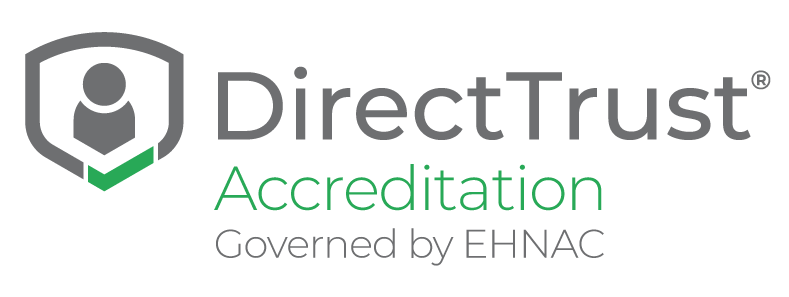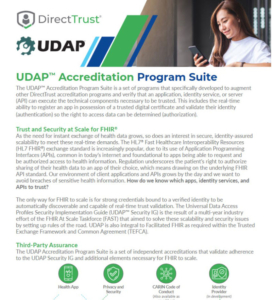UDAP
UDAP
The UDAP™ (Unified Data Access Profiles) Accreditation Programs are designed to help healthcare organizations demonstrate their ability to use trusted digital certificates for endpoint identity, registration, authentication, and attribute discovery for electronic healthcare transactions in real-time.
About UDAP Accreditation
The UDAP™ (Unified Data Access Profiles) Accreditation Program Suite is a set of Programs that are specifically developed to augment other DirectTrust accreditation programs (such as Health App) and verify that an application, identity service, or server (API) can execute the technical components to be trusted. This includes the real-time ability to register an app in possession of a trusted digital certificate and validate their identity (authentication) so the right to access data and can be determined (authorization). UDAP programs do require that an organization verify conformance with HL7’s Interoperable Digital Identity and Patient Matching Capabilities.
There are four UDAP Accreditation Programs:
- UDAP Client App – Basic
- UDAP Client App
- UDAP Server
- UDAP Identity Provider
About UDAP
The Unified Data Access Profiles, tested within the certification/accreditation process, are open standards that are free for any API ecosystem participant to implement and use, and extend OAuth and OpenID Connect to leverage trusted digital certificates. UDAP workflows eliminate the need for every FHIR endpoint to independently vet and manually register every client application and enable the reuse of OpenID credentials or digital certificates in JWT-based authentication. This solves the problem of having to generate and manage single-system credentials for each trio of client application, payer or provider data source, and consumer or other data requestor–a scalability challenge left unsolved by OAuth and OpenID as they stand.
By using the UDAP extensions to these standards along with trusted digital certificates instead of client secrets, participants who successfully complete this program signal enhanced security and confidence in their systems as app operators (UDAP Client App), identity providers (UDAP Identity Provider), and FHIR servers (UDAP Server)—which is essential to Da Vinci use cases and in FHIR exchange more generally – while also supporting real-time discovery of verified information about counter parties during dynamic (automated) client registration and authentication. See UDAP.org for information on Unified Data Access Profiles, enrollment for testing, educational materials and more.

